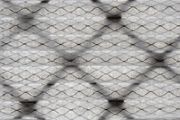 Although every forced-air heating and cooling system utilizes some sort of air filter, the first function of these devices is to protect your equipment from large particulate matter – not to improve indoor air quality. But over time, improving air quality has become a greater part of what most homeowners expect out of their HVAC air filter. Here's a quick guide to choosing and using air filters that provide your home with both benefits – an efficiently operating cooling and heating system and improved indoor air quality.
Although every forced-air heating and cooling system utilizes some sort of air filter, the first function of these devices is to protect your equipment from large particulate matter – not to improve indoor air quality. But over time, improving air quality has become a greater part of what most homeowners expect out of their HVAC air filter. Here's a quick guide to choosing and using air filters that provide your home with both benefits – an efficiently operating cooling and heating system and improved indoor air quality.
Why are filters necessary?
According to the federal Environmental Protection Agency, the air inside most homes is typically much dirtier than the air outdoors. Considering the fact that the average person spends 90 percent of his or her time indoors, it's hard to underestimate the importance of employing filtration devices as a means of removing dust and debris – and the pollutants they contain – from your indoor air.
Which filters are best?
When choosing a filter, look at its Minimum Efficiency Reporting Value (MERV), which for residential systems run from 1-16. The higher the MERV rating, the smaller the particulates a filter will remove. Keep in mind, though, that a high-efficiency MERV 13-16 filter may be so good at blocking tiny particulates that it may also impede your system airflow. For most home HVAC systems, a mid-range filter – between MERV 6 and 12, will provide a desirable balance between maintaining system airflow and protecting indoor air quality. When in doubt, consult with your trusted HVAC contractor to choose the right air filter for your home.
Can I wash a filter to lengthen its life span?
Most commercially available residential HVAC filters are designed to be replaced rather than washed. Washing these filters with water is a bad idea, as it can damage the filter's materials and create conditions suitable for mold and mildew growth. The safest way to clean a filter is by vacuuming it, but even this can cause damage. It's best to change out the filter once it gets dirty. These typically aren't expensive products.
How often should a filter be changed?
The life span of an air filter depends on its type and model, how frequently the HVAC equipment is being used during the cooling or heating seasons, the type of flooring inside of a home, and other factors that can increase airborne particulate matter (ie: pets, children and smoking). Generally, though, a 1-inch filter will last for two to three months and a 3- to 5-inch box filter can work for a year. The best course, though, is to get in the habit of inspecting your air filter on a monthly basis and changing it when necessary.
For more tips and information on air filters, contact the professionals at Hartman Brothers Heating & Air Conditioning. We proudly serve residents of the greater Fort Wayne area.
Our goal is to help educate our customers in New Haven, Indiana and surrounding Fort Wayne area about energy and home comfort issues (specific to HVAC systems). For more information about air filters and other HVAC topics, download our free Home Comfort Resource guide.
Image courtesy of Shutterstock
